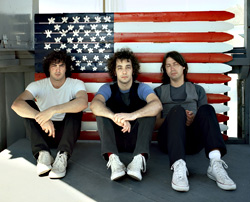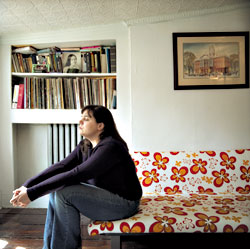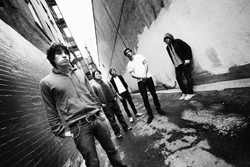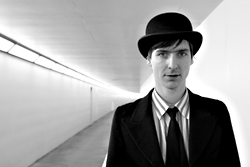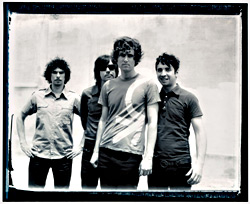Psst, wanna know a secret? Albert Hammond Jr., one of the two guitarists in the Strokes, has a new solo album out. It’s called Yours to Keep, and it slipped into stores in England rather quietly late last year, largely free of the fanfare that for the last few years has surrounded every movement by the Strokes. (The album hasn’t been issued in the United States yet; Rough Trade plans to release it here later this year.)
Additionally, Hammond’s touring America this winter, though it won’t be his name occupying the prime marquee real estate: He’s opening up for Incubus, the veteran alt-metal act. So what’s with the modesty?
“I didn’t wanna come out with a record and have it be like, ‘Guy from Band Makes Something!'” he says, adopting a booming newspaper-headline voice. “I don’t like that vibe. I kind of wanted to let it build and have people hear about it more through word of mouth—through the MySpace thing or me playing a live show. I just like making music, and the most refreshing way to do that is to put it out and go play shows.”
Hammond’s understated approach to Yours to Keep‘s promotion suits the album, which operates in an appealingly casual guitar-pop mode a la Fountains of Wayne or one-time Strokes opening act Ben Kweller. In low-key ditties like “Bright Young Thing” and “In Transit” (where he insists that “I’m not gonna change till I want to”), Hammond eschews the in-studio experimentation he and the Strokes dabbled in on 2006’s First Impressions of Earth in favor of a stripped-down home-demo feel.
That’s no accident. Hammond says he didn’t really know he was making a solo album until Yours to Keep was nearly completed. “I wrote ‘In Transit’ and ‘Everyone Gets a Star’ and just thought those were better than any of the songs I’d written in the past,” he says. (Singer Julian Casablancas writes the Strokes’ material.) “Then I had ‘Cartoon Music for Super-heroes’ and just thought, hmm, that’s three songs right there that feel interesting. I’d like to leave my studio space—my safety zone—and see if I can capture something different if I go somewhere else. I was just curious. So we started doing more, and before I knew it, I had a record.”
“We” is Hammond along with bassist Josh Lattanzi and drummer Matt Romano, a pair of around-town New York players with whom Hammond says he formed an impromptu band to make Yours to Keep. They handle most of the parts on the album, though producer Greg Lattimer also contributes, as do Casablancas and Sean Lennon. (For his part, Romano, who works with the Strokes’ management company and briefly filled in for Fabrizio Moretti when the drummer broke his hand in 2001, differs from Hammond, saying he “approached the whole project like we were making an album. I couldn’t in my right mind record this music that I really wanted people all over the world to hear and just sit on it.”)
The album was recorded over about two weeks between January 2005 and April 2006 in a series of New York City studios, according to Hammond, who says the stop-and-start method “was frustrating sometimes because I really wanted to go back and record again because things were coming out so well.” Still, he admits, he dug the relaxed pace. “That was the whole process of this record: living in the moment and not really thinking about what was gonna happen next.”
Though it’s something of an odd coupling, Hammond is similarly unworried about his tour with Incubus, which will find the guitarist playing to crowds likely outside the Strokes’ audience. “They offered it to me and I just thought to myself, ‘What a chance to maybe gain fans that would never, ever, ever hear my stuff,'” Hammond explains. The shows will also afford Hammond and his live band (which includes Romano, Lattanzi, keyboardist Marc Phillippe Eskanzi, and guitarist Steve Schlitz) the opportunity to play bigger rooms than they have on their own.
“I feel really lucky to be able to get with a big band, but on a small theater tour, which is so much nicer than when they play arenas,” says Hammond. “It’s kind of a pain in the ass to open for bands like that. Nobody comes to see the opening band in an arena.”
